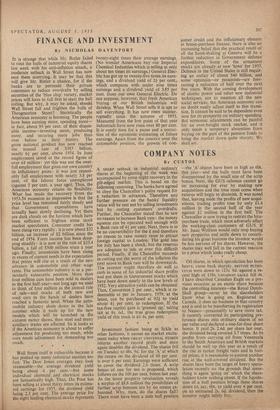FINANCE AND INVESTMENT
By NICHOLAS DAVENPORT
IT is strange that while Mr. Butler failed to rout the bulls of industrial equity shares last week with his anti-inflation attack, a moderate setback in Wall Street has now sent them scurrying. It may be that this will give Mr. Butler a chance, for if the banks are to persuade their private customers to reduce overdrafts by selling securities of the 'blue chip' variety, market prices will have to fall first to start the ball rolling. But why, it may be asked, should Wall Street fall and frighten the bulls of Throgmorton Street? Statistically the American economy is booming. The people have been earning more, spending more— in fact, about 93 per cent. of their dispos- able income—investing more, producing more, and securing more jobs than ever before in their history. The gross national product has now reached the annual rate of $383 billion, nearly 64 per cent. above 1954. In June employment stood at the record figure of over 64 million : yet this was not the over- full employment that gives our own country its inflationary pains : it was just reason- ably full employment with nearly 3.8 per cent. of the labour force unemployed (against 5 per cent. a year ago). Thus, the American economy retains its flexibility. What has made the recovery from the 1953-54 recession so impressive is that the price level has remained fairly steady and that Government expenditures have actually been slowly declining. Yet there are dark clouds on the horizon which have been sufficient to frighten some stock market speculators. Consumer credit has been rising very rapidly : it is now about $32 billion, an increase of $2 billion since the end of 1954. Farm income has been drop- ping steadily: it is now at the rate of $33.4 billion, a fall of $500 million since a year ago. Finally, inventories have been rising in excess of current needs in the expectation that prices will rise as a result of the new advance in automobile and other wage rates. The automobile industry is in a par- ticularly vulnerable position. More than four million cars have been sold to dealers in the first half-year—not long ago we used to think of four million as the annual rate of sale—and stocks of both new and used cars in the hands of dealers have reached a fantastic level. When the auto- mobile industry shuts down in the late summer while it tools up for the new models which will be launched in the autumn motor shows, then steel and many auxiliary trades are affected. So it looks as if the American economy is about to suffer adjustment for producing too much, while ours needs adjustment for demanding too much.
* * *
Wall Street itself is vulnerable because it has pushed up many industrial equities too fast. The Dow Jones averages may look reasonable—the average dividend yield being about 4 per cent.—but some individual chemical and electrical stocks are fantastically high. Thus, Du Pont has been selling at about thirty times its estima- ted earnings for 1955, the dividend yield being 2.3 per cent. The average price for the eight leading chemical stocks represents twenty-eight times their average earnings. (No wonder Americans buy our Imperial Chemical Industries which is selling at only about ten times its earnings.) General Elec- tric has got up to twenty-five times its earn- ings, and a dividend yield of 24 per cent., which compares with under nine times earnings and a dividend yield of 3.85 per cent. from our own General Electric. Do not suppose, however, that fresh American buying of our British 'industrials will develop. When Wall Street sells it is apt to sell everything. It has now risen uninter- ruptedly since the autumn of 1953. Measured from the low point of that year industrials have now risen over 80 per cent. It is surely time for a pause and a correc- tion of the optimistic estimating of future earnings. Apart from the concern over the automobile position, the growth of con- sumer credit and the inflationary element in house-purchase finance, there is also an increasing belief that the practical result of all the hand-shaking at Geneva will be a further reduction in Government defence expenditures. Some of the armament stocks are already at new 'lows' for 1955. Defence in the United States is still requir- ing an outlay of about $40 billion, and some optimists—or pessimists—are fore- casting a reduction of half over the next five years. With the coming development of atomic power and other new industrial techniques, not to mention all the new social services, the American economy can no doubt easily adjust itself to this transi- tion. It cannot be said to be dependent even now for its prosperity on military spending. But economic adjustments can be painful for an over-bought stock market, and it only needs a temporary abstention from buying on the part of the pension funds to bring the market down quite sharply. We shall see.


































 Previous page
Previous page